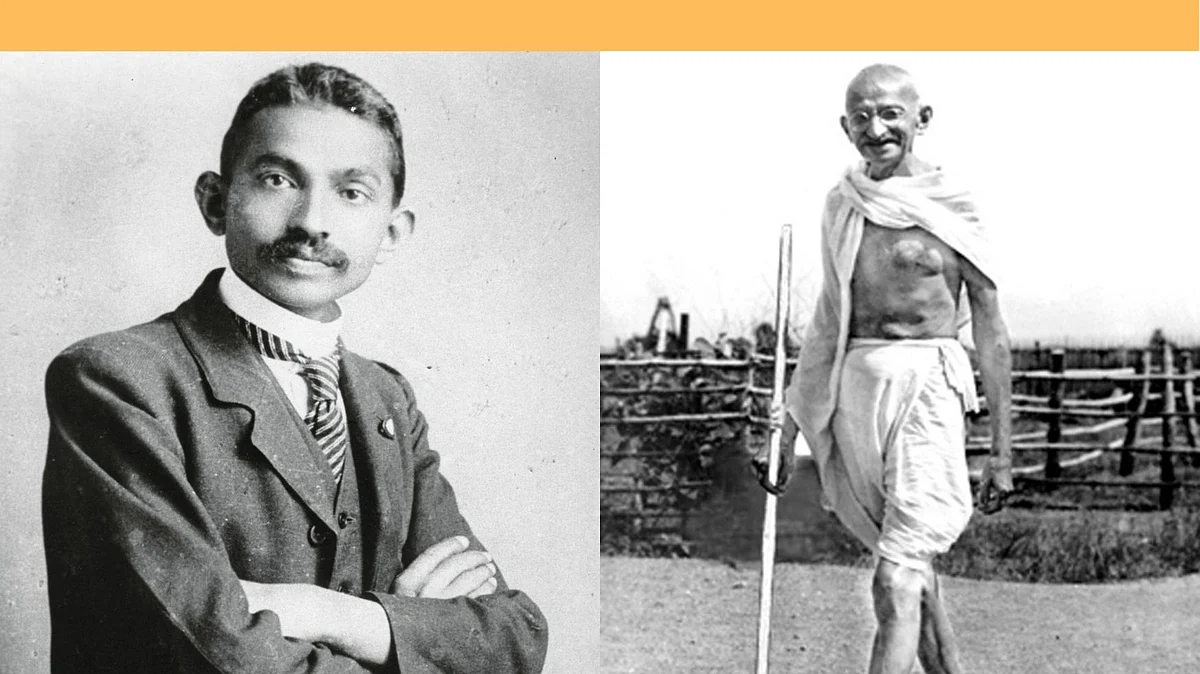The forgotten lesson from Gandhi: the power to say ‘No’ to oppressors
Mahatma Gandhi said 'No' to formal clothes in 1921. After his visit to Buckingham Palace, asked if he was adequately clothed, he said, "The King was wearing enough clothes for both of us"

Forgotten or not in India, Mahatma Gandhi continues to dominate international discourse and attention. But India either remains as violent, intolerant, unequal and discriminatory as it was in 1947 or has become worse. Indian youth, who take freedom for granted and have little time for the freedom struggle, have hazy ideas of the Mahatma fed on half-truths or falsehood.
Gandhiji's fight against discrimination in South Africa was known to the intelligentsia in India. It was Gopal Krishna Gokhale who advised Gandhi to return and work in India. So, Gandhi returned to India after spending 21 years (1893-1914) in Africa.
Everyone knows of the infamous incident of him being thrown out of a train after refusing to leave the first-class carriage. Gandhiji did not take this humiliation lying down. He protested and was allowed to board the train the next day. He is not known to have tolerated injustice to him or anyone else since then.
His uniqueness stems from the fact of his belief in moral forces, his belief in non-violence and his belief in non-cooperation with oppressors.
On non-cooperation, Gandhi says, “Non-cooperation is the nation’s notice that it is no longer satisfied to be in tutelage.” The nation, he declared, had taken to the harmless, natural and religious doctrine of non-cooperation in place of the unnatural and irreligious doctrine of violence.
He gave up formal clothes and took to loin clothes and in winter a shawl. He was contemptuously dismissed as a half-naked fakir by Winston Churchill. Gandhi gave up formal clothes in 1921, and Churchill described it an alarming and nauseating sight to see "a seditious, Middle Temple lawyer climbing the steps of the Viceregal lodge for parleys".
But Churchill was even more flummoxed when, a few years later, Gandhiji mounted the steps of the Buckingham Palace in his loin cloth to call on King George V and Queen Mary. As Gandhi was leaving and walking out of the gates of the Buckingham Palace (he wouldn't ride in a carriage or a car), a horrified journalist asked him if his clothes were adequate for a visit with the King. "But the King was wearing enough clothes for both of us," replied Gandhi gently, silencing the British Press.
His idea of Swadeshi was also as unique as his own personality. “In burning my foreign clothes, I burn my shame.” His creativity in introducing the “charkha” (spinning wheel) to the nation horrified even Rabindranath Tagore who thought it was regressive after the industrial revolution. But Gandhi wrote to Tagore to say, “A plea for the spinning wheel is for recognising the dignity of labour.”
What is striking about Gandhi is his invoking of the power of saying ‘NO’. In his own words, “We had lost the power of saying NO; it had become disloyal to say ‘No’ to the government; this deliberate refusal to cooperate is like the necessary weeding process that the cultivator resorts to before he sows.”
His understanding of the Indian problem was clinical. In his own words, “At the present moment, India has nothing to share with the world, save her degradation, pauperism and plagues.” Seven decades after his assassination, there is not much more that India can share with the world.
Gandhi’s legacy of non-violence, non-cooperation, civil disobedience, fasting, silence (maunvrat), charkha, Khadi, cleanliness, staying with the outcastes, cleaning their toilets, promotion of inter-caste marriages, inter-caste dining, gender equality, honesty and fellow feeling were almost surreal for those times. But they are even more important and needed today.
His simple but powerful armoury of tactics used on a large scale can paralyse any government, empower any society to overcome the ills and evils in it. His simplicity and selfless services for the nation and the freedom struggle attracted legions of followers and continues to do so even in present times.
Recently ICMR published Gandhi’s medical records, which indicate that he weighed 47.6 kg and his heart was normal. Gandhi was able to walk 79,000 km in his life time which is equivalent to 18 km per day.
Now that he is no more with us, his philosophy, ideas, strategy and interpretations of ancient Indian wisdom need to be applied again to the nation, which continues to suffer from exploitation, discrimination, hunger, joblessness and other evils. That will be a fitting tribute to honour the Mahatma about whom Albert Einstein wrote, "Generations to come will scarce believe that such a one as this ever in flesh and blood walked upon this earth."
The question is – do we still believe in Gandhi?
(The writer is a medical practitioner based in Mumbai)
Follow us on: Facebook, Twitter, Google News, Instagram
Join our official telegram channel (@nationalherald) and stay updated with the latest headlines
